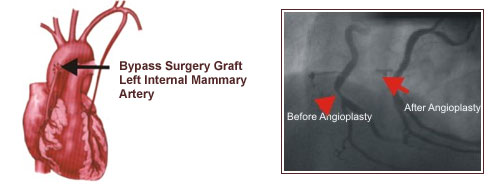Treatment of CAD
Management of Coronary Artery Disease
Various drugs are prescribed to the patients with Coronary Artery Disease depending on the type of Coronary Artery Disease the patient has and depending on the condition of the patient. These drugs may be prescribed to alleviate the symptoms of Angina, control the risk factors of Coronary Artery Disease or to prevent Heart Attack. Broadly these can be classified as:
- Anticoagulants and Antiplatelets
- Antihypertensives
- Statins
Anticoagulants and Antiplatelets: These in a broad sense are the drugs which are used as blood thinners or as drugs which prevent Blood Clot Formation. Most commonly used are Aspirin and Clopidogrel or Ticlopidine. Some patients may be prescribed heparin injections also.
Antihypertensives: These are various types of drugs which are prescribed to maintain normal blood pressure levels. Depending on the patient, the doctor will choose an appropriate drug and dose to treat hypertension. Examples may include Beta Blockers, Calcium Channel Blockers, ACE Inhibitors.
Statins: These drugs are prescribed to maintain or control the Cholestrol level in the blood. Some examples include Lovastatin, Rosuvastatin, etc.
Invasive Treatment of CAD

Transcatheter Interventions and Surgery are required when medicines cannot clear blocked arteries, or when a severely narrowed coronary artery may need more treatment to reduce the risk of a heart attack. Two major options are available: Coronary Angioplasty (PTCA) or Coronary Artery Bypass Surgery (CABG).
Both therapies have good track records among carefully selected patients. The decision to go with either option depends on how much narrowing exists, how many arteries are affected, the location of the narrowing, how much heart muscle is at risk, and individual patient factors, such as age and overall health.
